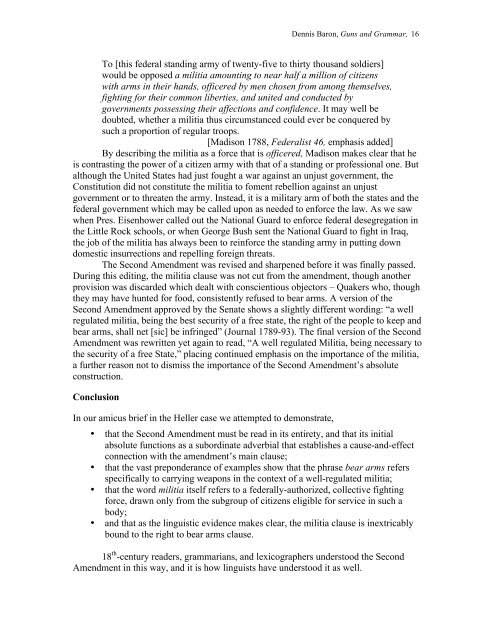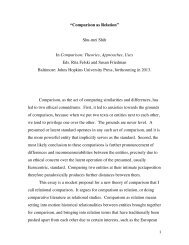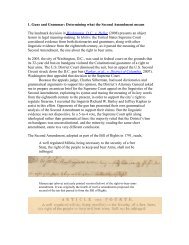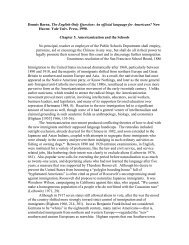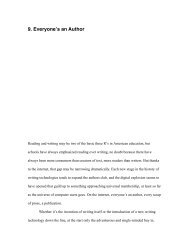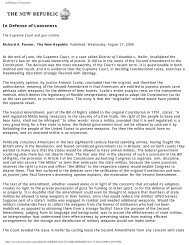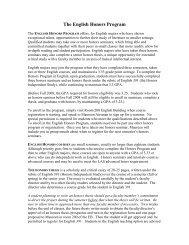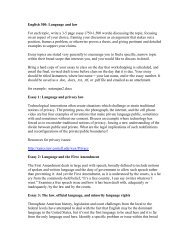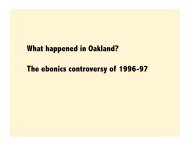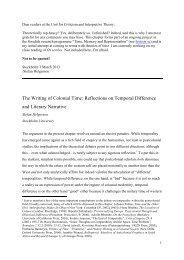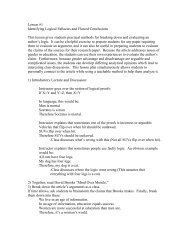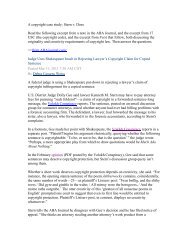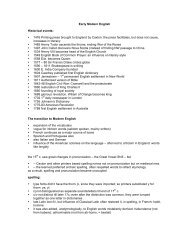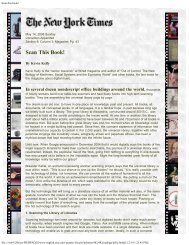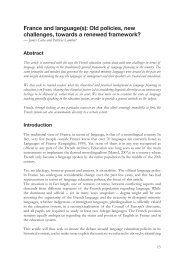Guns and Grammar: the Linguistics of the Second ... - English
Guns and Grammar: the Linguistics of the Second ... - English
Guns and Grammar: the Linguistics of the Second ... - English
Create successful ePaper yourself
Turn your PDF publications into a flip-book with our unique Google optimized e-Paper software.
Dennis Baron, <strong>Guns</strong> <strong>and</strong> <strong>Grammar</strong>, 16<br />
To [this federal st<strong>and</strong>ing army <strong>of</strong> twenty-five to thirty thous<strong>and</strong> soldiers]<br />
would be opposed a militia amounting to near half a million <strong>of</strong> citizens<br />
with arms in <strong>the</strong>ir h<strong>and</strong>s, <strong>of</strong>ficered by men chosen from among <strong>the</strong>mselves,<br />
fighting for <strong>the</strong>ir common liberties, <strong>and</strong> united <strong>and</strong> conducted by<br />
governments possessing <strong>the</strong>ir affections <strong>and</strong> confidence. It may well be<br />
doubted, whe<strong>the</strong>r a militia thus circumstanced could ever be conquered by<br />
such a proportion <strong>of</strong> regular troops.<br />
[Madison 1788, Federalist 46, emphasis added]<br />
By describing <strong>the</strong> militia as a force that is <strong>of</strong>ficered, Madison makes clear that he<br />
is contrasting <strong>the</strong> power <strong>of</strong> a citizen army with that <strong>of</strong> a st<strong>and</strong>ing or pr<strong>of</strong>essional one. But<br />
although <strong>the</strong> United States had just fought a war against an unjust government, <strong>the</strong><br />
Constitution did not constitute <strong>the</strong> militia to foment rebellion against an unjust<br />
government or to threaten <strong>the</strong> army. Instead, it is a military arm <strong>of</strong> both <strong>the</strong> states <strong>and</strong> <strong>the</strong><br />
federal government which may be called upon as needed to enforce <strong>the</strong> law. As we saw<br />
when Pres. Eisenhower called out <strong>the</strong> National Guard to enforce federal desegregation in<br />
<strong>the</strong> Little Rock schools, or when George Bush sent <strong>the</strong> National Guard to fight in Iraq,<br />
<strong>the</strong> job <strong>of</strong> <strong>the</strong> militia has always been to reinforce <strong>the</strong> st<strong>and</strong>ing army in putting down<br />
domestic insurrections <strong>and</strong> repelling foreign threats.<br />
The <strong>Second</strong> Amendment was revised <strong>and</strong> sharpened before it was finally passed.<br />
During this editing, <strong>the</strong> militia clause was not cut from <strong>the</strong> amendment, though ano<strong>the</strong>r<br />
provision was discarded which dealt with conscientious objectors – Quakers who, though<br />
<strong>the</strong>y may have hunted for food, consistently refused to bear arms. A version <strong>of</strong> <strong>the</strong><br />
<strong>Second</strong> Amendment approved by <strong>the</strong> Senate shows a slightly different wording: “a well<br />
regulated militia, being <strong>the</strong> best security <strong>of</strong> a free state, <strong>the</strong> right <strong>of</strong> <strong>the</strong> people to keep <strong>and</strong><br />
bear arms, shall net [sic] be infringed” (Journal 1789-93). The final version <strong>of</strong> <strong>the</strong> <strong>Second</strong><br />
Amendment was rewritten yet again to read, “A well regulated Militia, being necessary to<br />
<strong>the</strong> security <strong>of</strong> a free State,” placing continued emphasis on <strong>the</strong> importance <strong>of</strong> <strong>the</strong> militia,<br />
a fur<strong>the</strong>r reason not to dismiss <strong>the</strong> importance <strong>of</strong> <strong>the</strong> <strong>Second</strong> Amendment’s absolute<br />
construction.<br />
Conclusion<br />
In our amicus brief in <strong>the</strong> Heller case we attempted to demonstrate,<br />
• that <strong>the</strong> <strong>Second</strong> Amendment must be read in its entirety, <strong>and</strong> that its initial<br />
absolute functions as a subordinate adverbial that establishes a cause-<strong>and</strong>-effect<br />
connection with <strong>the</strong> amendment’s main clause;<br />
• that <strong>the</strong> vast preponderance <strong>of</strong> examples show that <strong>the</strong> phrase bear arms refers<br />
specifically to carrying weapons in <strong>the</strong> context <strong>of</strong> a well-regulated militia;<br />
• that <strong>the</strong> word militia itself refers to a federally-authorized, collective fighting<br />
force, drawn only from <strong>the</strong> subgroup <strong>of</strong> citizens eligible for service in such a<br />
body;<br />
• <strong>and</strong> that as <strong>the</strong> linguistic evidence makes clear, <strong>the</strong> militia clause is inextricably<br />
bound to <strong>the</strong> right to bear arms clause.<br />
18 th -century readers, grammarians, <strong>and</strong> lexicographers understood <strong>the</strong> <strong>Second</strong><br />
Amendment in this way, <strong>and</strong> it is how linguists have understood it as well.


